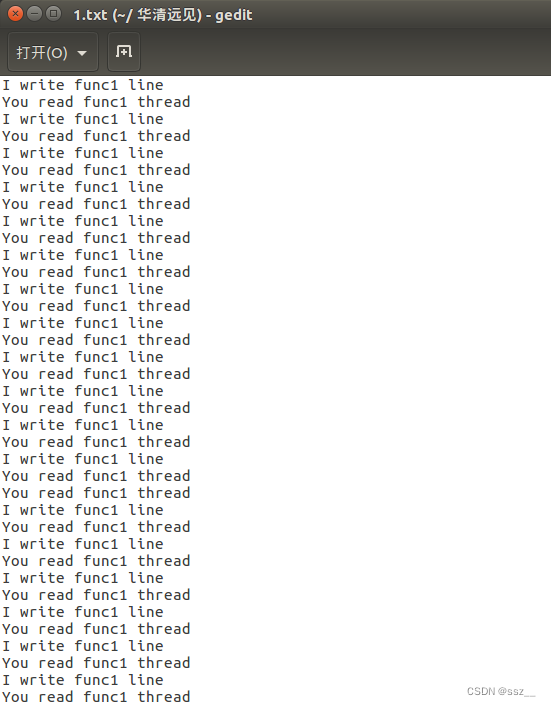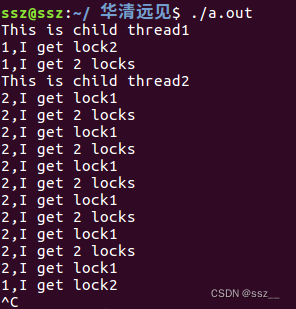线程的同步和互斥学习笔记
发布时间:2024年01月23日
目录
互斥锁的概念和使用?
线程通信-互斥
临界资源
- 一次只允许一个任务(进程、线程)访问的共享资源
概念:
????????不能同时访问的资源,比如写文件,只能由一个线程写,同时写会写乱。
????????比如外设打印机,打印的时候只能由一个程序使用。
????????外设基本上都是不能共享的资源。
????????生活中比如卫生间,同一时间只能由一个人使用。
临界区
- 访问临界资源的代码
互斥机制
- mutex互斥锁,任务访问临界资源前申请锁,访问完后释放锁
?互斥锁的创建和销毁
两种方法创建互斥锁,静态方式和动态方式:?
动态方式:?
#include <pthread.h>
int pthread_mutex_init(pthread_mutex_t *mutex,
const pthread_mutexattr_t *attr);- 成功时返回0,失败时返回错误码
- mutex指向要初始化的互斥锁对象
- attr互斥锁属性,NULL表示缺省属性
- man函数出现No manual entry for pthread_mutex_xxx解决方法:apt-get install manpages-posix-dev
?静态方式:
pthread_mutex_t mutex = PTHREAD_MUTEX_INITIALIZER;?锁的销毁:
int pthread_mutex_destory(pthread_mutex_t *mutex)在linux中,互斥锁并不占用任何资源,因此LinuxThreads中的pthread_mutex_destory()除了检查锁状态以外(锁定状态则返回EBUSY)没有其他动作。
?申请锁-pthread_mutex_lock
#include <pthread.h>
int pthread_mutex_lock(pthread_mutex_t *mutex);
int pthread_mutex_trylock(pthread_mutex_t *mutex);- 成功时返回0,失败时返回错误码
- mutex指向要初始化的互斥锁对象
- pthread_mutex_lock如果无法获得锁,任务阻塞
- pthread_mutex_trylock如果无法获得锁,返回EBUSY而不是挂起等待
?释放锁-pthread_mutex_unlock
#include <pthread.h>
int pthread_mutex_unlock(pthread_mutex_t *mutex);- 成功时返回0,失败时返回错误码
- mutex指向要初始化的互斥锁对象
?示例代码:
#include <stdio.h>
#include <pthread.h>
#include <unistd.h>
#include <string.h>
FILE *fp;
pthread_mutex_t mutex = PTHREAD_MUTEX_INITIALIZER; //多个文件需要多个锁
void *func1(void *arg)
{
pthread_detach(pthread_self());
printf("This is child thread1\n");
char str[] = "I write func1 line\n";
char c;
int i = 0;
//pthread_mutex_t mutex1;
while (1)
{
pthread_mutex_lock(&mutex);
while(i < strlen(str))
{
c = str[i];
fputc(c,fp);
usleep(1);
i++;
}
pthread_mutex_unlock(&mutex);
i = 0;
usleep(1);
}
pthread_exit("func1 exit");
}
void *func2(void *arg)
{
pthread_detach(pthread_self());
printf("This is child thread2\n");
char str[] = "You read func1 thread\n";
char c;
int i = 0;
//pthread_mutex_t mutex2;
while (1)
{
pthread_mutex_lock(&mutex);
while(i < strlen(str))
{
c = str[i];
fputc(c,fp);
usleep(1);
i++;
}
pthread_mutex_unlock(&mutex);
i = 0;
usleep(1);
}
pthread_exit("func2 exit");
}
int main()
{
pthread_t tid1,tid2;
void *retv;
int i;
fp = fopen("1.txt","a+");
if(fp == NULL)
{
perror("fopen");
return 0;
}
pthread_create(&tid1,NULL,func1,NULL);
pthread_create(&tid2,NULL,func2,NULL);
while(1)
{
sleep(1);
}
}
运行结果:

读写锁的概念和使用
?必要性:提高线程执行效率
特性:
- 写者:写者使用写锁,如果当前没有读者,也没有其他写者,写者立即获得写锁;否则写者将等待,直到没有读者和写者。
- 读者:读者使用读锁,如果当前没有写者,读者立即获得读锁;否则读者等待,直到没有写者。
?注意:
- 同一时刻只有一个线程可以获得写锁,同一时刻可以有多个线程获得读锁。
- 读写锁出于写锁状态时,所有试图对读写锁加锁的线程,不管是读者试图加读锁,还是写者试图加写锁,都会被阻塞。
- 读写锁处于读锁状态时,有写者试图加写锁时,之后的其他线程的读锁请求会被阻塞,以避免写者长时间的不写锁。
- ?初始化一个读写锁? ? ? ? pthread_rwlock_init
- 读锁定读写锁? ? ? ? ? ? ? ? pthread_rwlock_rdlock
- 非阻塞读锁定? ? ? ? ? ? ? ? pthread_rwlock_tryrdlock
- 写锁定读写锁? ? ? ? ? ? ? ? pthread_rwlock_wrlock
- 非阻塞写锁定? ? ? ? ? ? ? ? pthread_rwlock_trywrlock
- 解锁读写锁? ? ? ? ? ? ? ? ? ? pthread_rwlock_unlock
- 释放读写锁? ? ? ? ? ? ? ? ? ? pthread_rwlock_destroy
?示例代码:
#include <pthread.h>
#include <stdio.h>
#include <unistd.h>
#include <string.h>
pthread_rwlock_t rwlock;
FILE *fp;
void * read_func(void *arg){
pthread_detach(pthread_self());
printf("read thread\n");
char buf[32]={0};
while(1){
//rewind(fp);
pthread_rwlock_rdlock(&rwlock);
while(fgets(buf,32,fp)!=NULL){
printf("%d,rd=%s\n",(int)arg,buf);
usleep(1000);
}
pthread_rwlock_unlock(&rwlock);
sleep(1);
}
}
void *func2(void *arg){
pthread_detach(pthread_self());
printf("This func2 thread\n");
char str[]="I write func2 line\n";
char c;
int i=0;
while(1){
pthread_rwlock_wrlock(&rwlock);
while(i<strlen(str))
{
c = str[i];
fputc(c,fp);
usleep(1);
i++;
}
pthread_rwlock_unlock(&rwlock);
i=0;
usleep(1);
}
pthread_exit("func2 exit");
}
void *func(void *arg){
pthread_detach(pthread_self());
printf("This is func1 thread\n");
char str[]="You read func1 thread\n";
char c;
int i=0;
while(1){
pthread_rwlock_wrlock(&rwlock);
while(i<strlen(str))
{
c = str[i];
fputc(c,fp);
i++;
usleep(1);
}
pthread_rwlock_unlock(&rwlock);
i=0;
usleep(1);
}
pthread_exit("func1 exit");
}
int main(){
pthread_t tid1,tid2,tid3,tid4;
void *retv;
int i;
fp = fopen("1.txt","a+");
if(fp==NULL){
perror("fopen");
return 0;
}
pthread_rwlock_init(&rwlock,NULL);
pthread_create(&tid1,NULL,read_func,1);
pthread_create(&tid2,NULL,read_func,2);
pthread_create(&tid3,NULL,func,NULL);
pthread_create(&tid4,NULL,func2,NULL);
while(1){
sleep(1);
}
}
死锁的避免
- 锁越少越好,最好使用一把锁
- 调整好锁的顺序
- 使锁进行错位
示例代码:
#include <stdio.h>
#include <pthread.h>
#include <unistd.h>
#include <string.h>
FILE *fp;
pthread_mutex_t mutex = PTHREAD_MUTEX_INITIALIZER; //多个文件需要多个锁
pthread_mutex_t mutex2 = PTHREAD_MUTEX_INITIALIZER; //多个文件需要多个锁
void *func1(void *arg)
{
pthread_detach(pthread_self());
printf("This is child thread1\n");
char str[] = "I write func1 line\n";
char c;
int i = 0;
//pthread_mutex_t mutex1;
while (1)
{
pthread_mutex_lock(&mutex2);
printf("%d,I get lock2\n",(int)arg);
sleep(1);
pthread_mutex_lock(&mutex);
printf("%d,I get 2 locks\n",(int)arg);
pthread_mutex_unlock(&mutex);
pthread_mutex_unlock(&mutex2);
sleep(10);
}
pthread_exit("func1 exit");
}
void *func2(void *arg)
{
pthread_detach(pthread_self());
printf("This is child thread2\n");
char str[] = "You read func1 thread\n";
char c;
int i = 0;
//pthread_mutex_t mutex2;
while (1)
{
pthread_mutex_lock(&mutex);
printf("%d,I get lock1\n",(int)arg);
sleep(1);
pthread_mutex_lock(&mutex2);
printf("%d,I get 2 locks\n",(int)arg);
pthread_mutex_unlock(&mutex2);
pthread_mutex_unlock(&mutex);
usleep(10);
}
pthread_exit("func2 exit");
}
int main()
{
pthread_t tid1,tid2;
void *retv;
int i;
fp = fopen("1.txt","a+");
if(fp == NULL)
{
perror("fopen");
return 0;
}
pthread_create(&tid1,NULL,func1,1);
sleep(5);
pthread_create(&tid2,NULL,func2,2);
while(1)
{
sleep(1);
}
}
?运行结果:

文章来源:https://blog.csdn.net/ssz__/article/details/135730444
本文来自互联网用户投稿,该文观点仅代表作者本人,不代表本站立场。本站仅提供信息存储空间服务,不拥有所有权,不承担相关法律责任。 如若内容造成侵权/违法违规/事实不符,请联系我的编程经验分享网邮箱:chenni525@qq.com进行投诉反馈,一经查实,立即删除!
本文来自互联网用户投稿,该文观点仅代表作者本人,不代表本站立场。本站仅提供信息存储空间服务,不拥有所有权,不承担相关法律责任。 如若内容造成侵权/违法违规/事实不符,请联系我的编程经验分享网邮箱:chenni525@qq.com进行投诉反馈,一经查实,立即删除!
最新文章
- Python教程
- 深入理解 MySQL 中的 HAVING 关键字和聚合函数
- Qt之QChar编码(1)
- MyBatis入门基础篇
- 用Python脚本实现FFmpeg批量转换
- Blockchain-APTrace-Fabric-master农产品溯源开源项目详解
- 1096. 地牢大师(蓝桥杯/bfs宽搜求最小距离)
- 使用SftpDrive + SourceInsight阅读远程服务器代码
- 数据结构与算法教程,数据结构C语言版教程!(第二部分、线性表详解:数据结构线性表10分钟入门)九
- 环保从餐桌开始,油烟净化器为何是餐饮店的必备神器
- 基于SSM的中学课内小说阅读与学习系统的设计论文
- Kubernetes核心实战
- 4 - JdbcTemplate
- SoC芯片中的复位
- 创作第一个小程序Day2